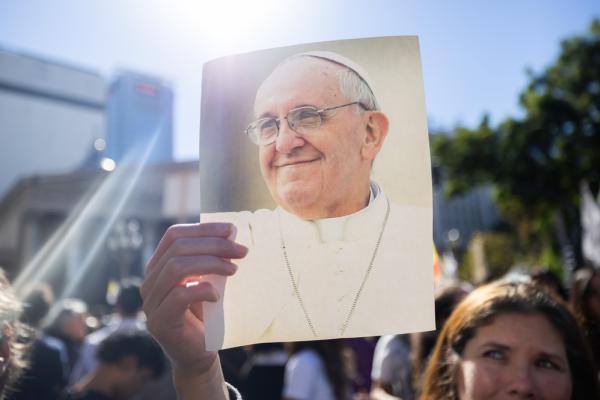It’s summer: a time for outdoor movies, concerts, make-your-own-medicine workshops, beach visits, and nature hikes (if you don’t mind mosquitoes). And if your summer is anything like mine, it also means interruptions, unreachable colleagues, and unfinished business.
Summer is also a time of tension. Yes, there are joyful outings and abundant carne asada tables, but also devastating losses in our neighborhood and record-high temperatures. Supreme Court decisions are taking away our rights, gun violence is taking away our babies, governments are zealous to take away food aids from our tables and healthcare from our neighbors. We need more than cool drinks to refresh our souls.
Yet I know it’s hard to add one more thing to our list when we’re already trying to keep track of all that’s happening and managing all the extra tasks of the season (I see you!). Our hearts, our bodies, and souls can use a getaway to a place where gentle creeks rustle and warm-but-not-too-warm sunrays land softly on our skin.
This mosquito-free paradise is what I hope to offer you. The following practices can help you revitalize your spiritual life and step into the vibrant rest of the season.
1. Use transitions.
Summer is so active, there is hardly any time to block off for spiritual renewal. Work with that. Do you have five minutes between lunch and packing to go out? Breathe. Say a short prayer. Pause. Drop your shoulders and check in with your body. Spiritual renewal does not have to be elaborate; work it into a rhythm in your daily transitions.
Growing up, my mom would pray every time we would get in the car. Before she pulled out the driveway, she would say, “Señor, llévanos y regresanos con bien” (Lord, send us out and bring us back in a good state/in well-being). Then we would all cross ourselves and on we went. It was an acknowledgement that our wellbeing and our whereabouts were dependent on the Lord, that our lives were oriented toward God. This practice is so engrained in me. I know in my bones that I can do nothing apart from God, and this understanding came from those one-minute transitions between getting in the car and starting to drive.
2. Cleanse with water.
Pools, lakes, beaches, waterfalls, and hoses are summer staples. The next time you are near a body of water — or even just taking a shower — I invite you to do a cleansing ritual. Water can serve as a sign of God’s refreshing love being poured over us. It can be a reminder of baptismal vows, of newness of life, and God’s abundant provision for the Earth. The following cleansing ritual is not for our bodies — your body is already good and doesn’t need cleansing to make it holy; instead, this ritual is to remove the imprints unjust systems have made on us.
Let falling water cover you. Wet your head, massage your scalp, and spend time unloading the worries that have burdened your mind. Know God cares. Take a deep breath and engage in the practice of confession. Pour some water on your face and graze your wet hands over it. Starting with your forehead: Are there thoughts you need to release? Have you entertained any narratives that dehumanize people, exploit creation, or make some people more valuable than others? Have you stored hatred or contempt? This is the time to confess.
Place your hands over your eyes. Have you been turning from sights that are difficult to engage? Have you been ignoring realities that break God’s heart? Talk to your gracious Creator about this.
Move to your lips and meditate on words you may have said that quieted life or abused power. Reflect on moments where you may have withheld words that would have healed, distributed power, or honored wisdom. With your hands over your heart, consider any carelessness you have shown or care you may have failed to show, particularly to those who have often been pushed to the margins, those in your neighborhood, and those in other nations. Wash your hands and meditate on any way in which you have participated or been complicit in oppression through your labor or economic power. Continue to cleanse with water every part of your body that needs it. Consider Psalm 51:1-2 as a prayer, “Have mercy on me, O God, according to your steadfast love; according to your abundant mercy, blot out my transgressions. Wash me thoroughly from my iniquity, and cleanse me from my sin.”
Keep silent for some time. Listen for God. Where is God inviting you? When you are ready, receive the living water that Jesus offers. Take in the water that will not make you thirst again. Pour water all over yourself. Swim if you are able. Splash. Rejoice. If you wish, finish with a reading of Psalm 103.
A word of caution for folks who have suffered violence or trauma in their body, including trans, non-binary, disabled, fat, Black, Indigenous, and others who racialized trauma expert Resmaa Menakem terms “bodies of culture”: You may want to tweak this practice to include cleansing the violence that has been inflicted over your body. As you cleanse, you may consider phrases like, “Pour living water over me” or, “Restore to me the joy of your salvation and sustain in me a willing spirit (Psalm 51:12).”
3. Remember your ancestors.
At a recent conference, someone asked Rev. Kelly Brown Douglas, dean of the Episcopal Divinity School at Union Theological Seminary, how she kept engaging in the work of justice and antiracism even as it is so heavy on the heart. She shared how she took her germaphobe self to Washington, D.C.’s Black Lives Matter Plaza during the pandemic. In the crowd of people protesting, Douglas remembered those who never took a free breath, including her great grandma, Momma Mary. To this day when despair sets in, Douglas tells herself: “We got this, because people who were thought to be chattel fought.”
What battles did your ancestors fight? What just practices helped them survive? What wisdom gave them answers they needed? Be reflective as you engage in this practice, recognizing that our ancestors were complex. Broaden your concept of ancestors and think of the clouds of witnesses who have gone before us, people who embodied just living.
Setting up altars of remembrance can be a powerful way to help you draw strength for the journey ahead. Start small. You might want to dedicate a space on a table or a shelf for this. Set up a piece of cloth that reminds you of your ancestors. Add a candle to remind you of the light they carried when they dwelled on Earth; include a picture if you have one. Put a fresh flower or a live plant to remind you that their lives continue in you. Just as the Israelites built an altar with stones from the Jordan to remind them of how God had opened the waters, write a word or a phrase on a stone that reminds you of your ancestors’ stories and wisdom.
Go to the altar regularly and spend a few minutes delighting in the wisdom and tenacity the ancestors had to figure it out and fight for justice. Thank God for their lives. Or build a travel altar with similar but smaller elements that you can wrap up and bring wherever the summer takes you.
4. Cultivate relationships.
At the same conference, Rev. Stephanie Spellers, author of several books on ministry and mission, responded to the same question on despair by emphasizing the importance of small groups that gather regularly to share deep conversations and faith practices like prayer. I agree, but I know what you may be thinking: I told you that my hope was for these practices to feel like paradise, and church small groups often sound like the opposite.
Hear me out: Find your people. Rev. Sarah Augustine, a Pueblo (Tewa) woman and founder of the Coalition to Dismantle the Doctrine of Discovery says, “The antidote to despair is knowing we are not alone.” Finding and gathering with your people will require effort, but it’s not without reward. Lean into structures that provide easy access to community like small groups, even if they are online. Summer is the perfect time to host a three-week group that meets for simple prayer and barbecue to nourish the body and the soul.
I grew up in Mexico City, and migration has meant that my heart is always in two places. People often ask me what I miss the most, and without hesitation I always say: the spontaneity of communal life. It was common for my extended family members to drop by or vice versa; we always had food for each other and there was no need for elaborate planning. We assumed that we lived life together; we did not have to pencil each other in on our planners. Two years ago, I found a group of friends who take me as I am; we share food off our plates and let each other into our messy homes. They bring me un pedacito de casa(a piece of my home). They all live about an hour away in another city, but their company is so refreshing, I take the train or make the drive regularly.
So find your people. Join a small group. It can be virtual. Pray with others. Clear your calendar. Make it happen. I need you to survive.
5. Take a nap.
Sometimes the vibrancy of summer can feel like a blazing fire. Summer is active, so you need rest if you plan to engage. Rest is a command from our God. It’s an invitation to abundant life and God’s provision for our weary souls. You are worthy of rest because the God who made you provided the sabbath, the jubilee, the heavenly home of God’s rest for you. Take what is yours. Rev. Tricia Hersey, the founder of The Nap Ministry and author of Rest Is Resistance writes: “Any system that degrades and ignores our civil right to have care, rest, leisure, and space must be examined and illuminated. The time is up for any shallow wellness work that doesn’t dismantle systems that are making us unwell.”
I praise my colleague who, knowing she had an evening meeting, took advantage of her space, grabbed the office cushions, and set up in her office for a nap. While the rest of us worked into the evening, she dimmed down the lights, turned off her computer, and said, “Rest is sacred, rest is resistance.” As people of God, we are on our way to God’s rest and napping is one way of bringing that reality into this existence. This summer, resist the temptation to fix it all, to attend all the events, to see everyone and be everywhere, to measure success by exhaustion. Take a nap.
More resources on the spirituality of rest:
+We Need Sabbath. In the U.S., We Don't Trust Each Other Enough To Take It
+Rest Is Holy, Not a Reward for the Productive
+Rest Is Resistance, Too
Got something to say about what you're reading? We value your feedback!







